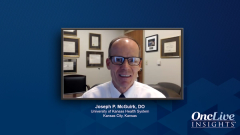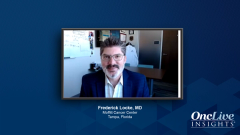
Innovations in Immunotherapy: CAR T-Cells, Allogeneic Approaches, and Bispecifics
Expert perspective on advancements in cancer immunotherapy, including CAR-T cells, allogeneic strategies, and the role of bispecific antibodies.
Episodes in this series

Video synopsis is AI-generated and reviewed by OncLive editorial staff.
The field of cancer immunotherapy is witnessing significant innovations, particularly in the treatment of non-Hodgkin lymphomas, including diffuse large B-cell lymphoma (DLBCL). One major challenge is the time it takes to manufacture CAR T-cell therapies, which can range from a month to a month and a half. Patients with aggressive lymphomas may require bridging chemotherapy while awaiting CAR T-cell therapy, which can be problematic if their condition deteriorates during this time.
Another consideration is whether a patient's own T cells are the optimal choice for CAR T-cell therapy. Some researchers are exploring the use of third-party donors to supply more robust T cells that have not been exposed to chemotherapy. By selecting specific T-cell subsets and genetically engineering them, it may be possible to create more potent and less toxic CAR T cells. The use of healthy third-party donors, particularly young individuals, can potentially provide T cells for hundreds of patients. However, there is a significant challenge in using allogeneic CAR T cells from third-party donors. The recipient's immune system may recognize them as foreign, leading to rejection or graft-vs-host disease. This issue has been addressed through the revolutionary gene-editing technology CRISPR-Cas9, which allows for precise modification of cells to avoid recognition by the recipient's immune system.
Allogeneic CAR T cells, which involve CRISPR-edited cells, have shown promise in clinical trials. These edited CAR T cells have demonstrated remarkable overall and complete responses in lymphoma patients, with some of these responses being impressively durable. This approach opens new possibilities for lymphoma treatment. Additionally, bispecific antibodies are emerging as another effective treatment modality. Bispecifics bring about CAR T cell–like killing processes by using a 2-forked construct, one end binding to the cancer cell and the other to T cells. This strategy has shown impressive results, even in patients for whom CAR T-cell therapy failed, outperforming traditional chemotherapy or immune checkpoint pathway strategies in some cases.
The timing of bispecific antibody treatment remains a question, as it's unclear whether they should be administered earlier in the treatment sequence or reserved for later lines of therapy. There is currently a lack of head-to-head trials comparing bispecifics to CAR T-cell therapy, making it difficult to determine their relative effectiveness in specific lymphoma types. Both cell therapy and bispecific antibodies have their advantages and disadvantages. CAR T-cell therapy is a 1-time treatment, while bispecifics require repeated dosing over an extended period. This underscores the transformative era of cancer therapeutics, marked by a deeper understanding of the immune system and the development of a wide array of cell-based therapies, from cells to T-cell receptor-modified constructs, natural killer cell-modified CARs, macrophage CAR cells, and more. This rich landscape of therapeutic options holds promise not only for non-Hodgkin lymphomas but also for various other blood cancers, with numerous studies currently underway to unlock their potential.






































